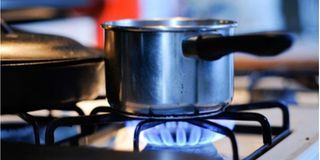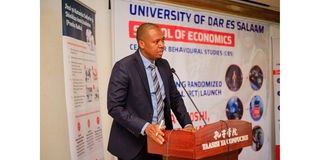Prime
University of Dar es Salaam's researchers rally behind clean cooking push

What you need to know:
- Through its Centre for Behavioural Studies (CBS), the university has launched the final phase of the Clean Cooking Randomised Controlled Trial (RCT), targeting over 150 households in Kinondoni District, Dar es Salaam
Dar es Salaam. Researchers from the University of Dar es Salaam’s School of Economics have stepped in to support Tanzania’s clean cooking agenda through evidence-based research aimed at accelerating LPG adoption.
Through its Centre for Behavioural Studies (CBS), the university has launched the final phase of the Clean Cooking Randomised Controlled Trial (RCT), targeting over 150 households in Kinondoni District, Dar es Salaam.
The seven-month study seeks to evaluate the impact of LPG on household air quality and health.
“Our goal is to generate evidence to guide policy and shift households from charcoal and firewood to cleaner fuels,” CBS Coordinator, Dr Innocent Pantaleo, said on April 23.
Despite the government’s Clean Cooking Energy Strategy 2024–2034 and efforts such as gas cylinder distribution by the Rural Energy Agency (REA), fewer than 15 percent of Tanzanian households use LPG regularly.
Research by CBS and partners, including the University of Liverpool and institutions across East and Central Africa, found that many families use LPG only for quick meals, sticking with charcoal for longer cooking due to perceived cost.
“The main barrier isn’t fuel cost—it’s the upfront cost of cylinders and stoves,” said Dr Pantaleo.
To address this, CBS partnered with M-Gas Resources, which uses smart meters allowing users to pay in small amounts, similar to buying charcoal.

Assistant Commissioner for Policy Analysis at the ministry of Finance, Dr Remidius Ruhinduka, addresses stakeholders during the launch of the final phase of a key research project titled Clean Cooking Randomized Control Trial (RCT) at the University of Dar es Salaam. PHOTO | COURTESY
Assistant Commissioner for Policy Analysis at the Ministry of Finance, Dr Remidius Ruhinduka, praised the role of research in policy: “Our strategies need to be backed by data to accelerate change.”
With health, environmental, and economic benefits, experts urge private sector involvement to expand clean energy access.
“If we aim for 90 percent LPG use by 2034, we need innovation and scale,” said Dr Ruhinduka.
“Clean cooking is not just about technology—it’s about changing habits,” said Dr Pantaleo.
“We’re building a case that LPG is safer, healthier, and ultimately more affordable.”





